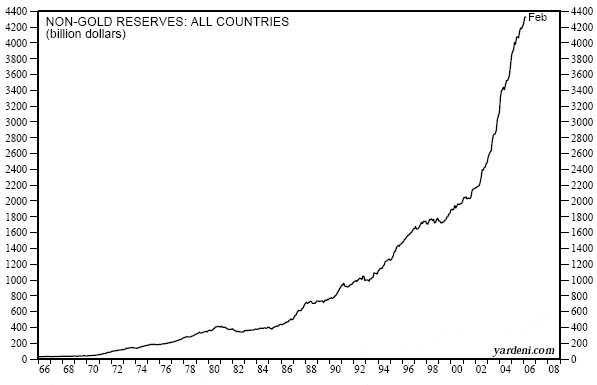 Sailing Without An
Anchor Sailing Without An
Anchor
Puru Saxena
16 June, 2006
RECENT HISTORY - Up until the early 1970's, our planet
followed the Bretton Woods agreement of international monetary
management. This system sought to secure the advantages of the
gold standard without its disadvantages. The US dollar was linked
to gold at the rate of $35 per ounce of gold and other nations
pegged their currencies to the US dollar. At this fixed rate
of US$35 per ounce, foreign governments and central banks were
able to exchange dollars for gold. Bretton Woods established
a system of payments based on the dollar, in which all currencies
were defined in relation to the dollar, which was itself convertible
into gold. The U.S. currency was now effectively the world currency,
the standard to which every other currency was pegged. As the
world's key currency, most international transactions were denominated
in dollars.
During the 1960's, the US accumulated massive deficits and when
the French demanded gold in exchange for US dollars, the US refused
to redeem its dollars in gold. On 15 August 1971, US President
Nixon shut the "gold window", thereby removing gold
from the monetary system. The result was inevitable - currencies
started floating against each other and without gold as the anchor,
nations gave up on their monetary discipline. A fabulous new
era of "endless prosperity" had arrived! Central banks
became obsessed with monetary inflation, world-trade benefited
and the world's foreign exchange reserves exploded. Figure 1
captures this development in all its glory. In 1971, the non-gold
reserves of all countries were worth US$100 billion and today
these have grown to roughly $4.3 trillion - an alarming 43-fold
increase in 35 years!
Figure 1: Explosion
in global non-gold reserves!
 Source:
www.yardeni.com
Source:
www.yardeni.com
As the amount
of money within the financial system increased due to the absence
of gold, prices within the economy started rising. Once currencies
were no longer linked to gold, the global economy became a ship
without an anchor, floating from one "boom and bust"
cycle to another! Rampant monetary inflation fuelled by the growth
of credit turned the capital markets into one giant casino as
punters worldwide (often loaded with credit) searched for the
next opportunity to make a fortune.
In the 1970's, this excessive liquidity churned out by the central
banks found a home in commodities as the price of raw materials
went crazy. During the 1980's, investors piled into Japanese
assets as stocks and real-estate soared. And in the 1990's, when
we were ushering in the new millennium, our world fell in love
with the technology, media and telecom sector. Each of these
booms was accompanied by rapid credit growth, heavy speculation
based on unrealistic expectations and unfortunately they all
met their common fate - the eventual bust!
Since the "tech wreck" in 2000, this excessive capital
floating around the system has found a refuge in real-estate.
Today, the public's money is predominantly in property and everyone
is convinced that the current boom will last forever. "What
me worry? Nah, real-estate always goes up!" seems to be
the common argument. Allow me to share a secret - no asset-class
goes up in a straight line and property investors may be in for
a rude shock if interest-rates continue to rise, which in my
view is inevitable.
History has shown that rising interest-rates have always been
bad news for stocks, bonds and highly-leveraged properties. Will
this time be different? I guess we'll find out!
THE FUTURE - I must admit that I don't have a crystal
ball, but wait, neither does anybody else. In the business of
investing, we're always dealing with change and all we have in
our arsenal are probabilities based on the ongoing developments
around us. At present, I'm most certain about the following mega-trends,
which are likely to intensify over the coming decade -
- Transfer of
wealth from the West to the emerging world
.
- Transfer of
capital from financial to tangible assets
I base my above
forecasts on the fact that due to globalisation and the opening
up of China and India, 2.3 billion people have now entered the
workforce and these people are hungry for success and a better
quality of life. After having lived in dismal poverty for decades,
the middle-class in these developing countries has now "tasted
blood" and it is determined to catch-up with the West.
To be perfectly honest, China is much more developed and its
infrastructure far superior than India's. In fact, I would argue
that China probably has the best roads in the world. I might
as well add that the same can't be said of its drivers!
Last week, I traveled to Suzhou (2-hour drive from Shanghai)
for a meeting with an extremely successful Chinese businessman.
Mr. Wong is the new breed of entrepreneurs and represents modern,
capitalist China. He established his manufacturing business 10-years
ago and today his annual turnover is US$240 million. Mr. Wong
is in the process of building another factory; he has just bought
a luxurious Mercedes and his children study in exclusive schools
in England! Moreover, I was amazed to learn that one of Mr. Wong's
friends had just built a 5-star luxury hotel in Suzhou by paying
US$30 million upfront in cash! Welcome to communist China!
Let's face it, the 21st century will belong to China. Shanghai
is a phenomenal city with countless skyscrapers, huge shopping
malls, great restaurants and an energetic population. Even a
small town like Suzhou is home to massive factories, modern buildings
and its people have an incredible work ethic. You really have
to visit China to see what's going on in the world's fastest
growing economy! For sure, its vast majority is still poor and
the wealth divide is getting bigger but I am very excited about
China's future. If my assessment is correct, the world's oldest
civilization has a bright future.
The above is an excerpt from Money Matters, a monthly economic
publication, which highlights extraordinary investment opportunities
in all major markets. In addition to the monthly reports, subscribers
also benefit from timely and concise "Email Updates",
which are sent out when an important development in the capital
markets warrants immediate attention. Subscribe
Today!
Puru Saxena
 Saxena Archives Saxena Archives
email: puru@purusaxena.com
website: www.purusaxena.com Puru Saxena publishes Money Matters, a monthly economic report, which highlights extraordinary investment opportunities in all major markets. In addition to the monthly report, subscribers also receive "Weekly Updates" covering the recent market action. Money Matters is available by subscription from www.purusaxena.com. Puru Saxena is the founder of Puru Saxena Wealth Management, his Hong Kong based firm which manages investment portfolios for individuals and corporate clients. He is a highly showcased investment manager and a regular guest on CNN, BBC World, CNBC, Bloomberg, NDTV and various radio programs. Copyright ©2005-2015 Puru Saxena Limited. All rights reserved.
Recent Gold/Silver/$$$ essays at 321gold:
Feb 20 Silver North Hits Best Hole in Their History in Yukon Bob Moriarty 321gold
Feb 20 The Next Gold Stocks Rally Hot Juniors Morris Hubbartt 321gold
Feb 19 ESGold Moves to Production Alongside Exploration Bob Moriarty 321gold
Feb 17 A Bull Era: Robots & Gold Stewart Thomson 321gold
Feb 15 Bitcoin, Stock Market & Gold captainewave 321gold
Feb 15 L@@K Amazon Kindle and Paperback Books by... Bob Moriarty 321gold
|
321gold Inc

|

 Sailing Without An
Anchor
Sailing Without An
Anchor
